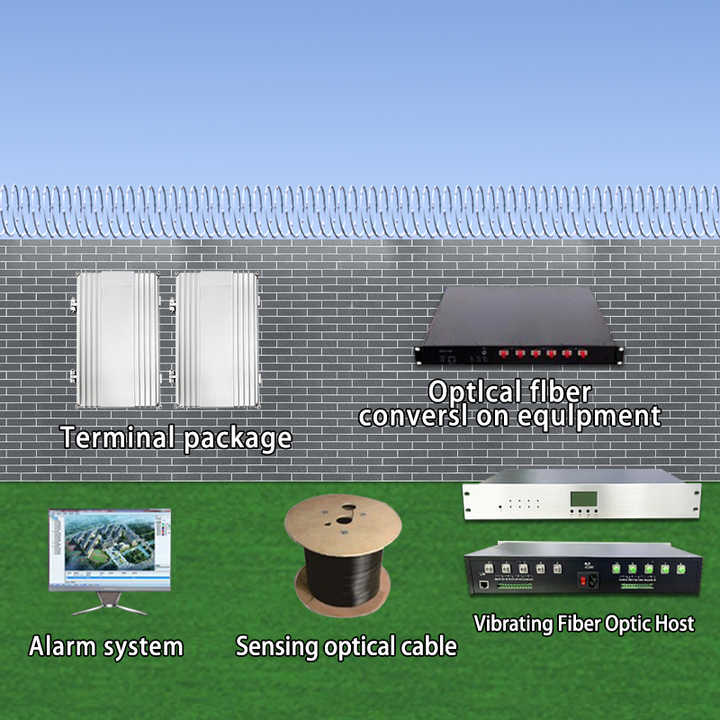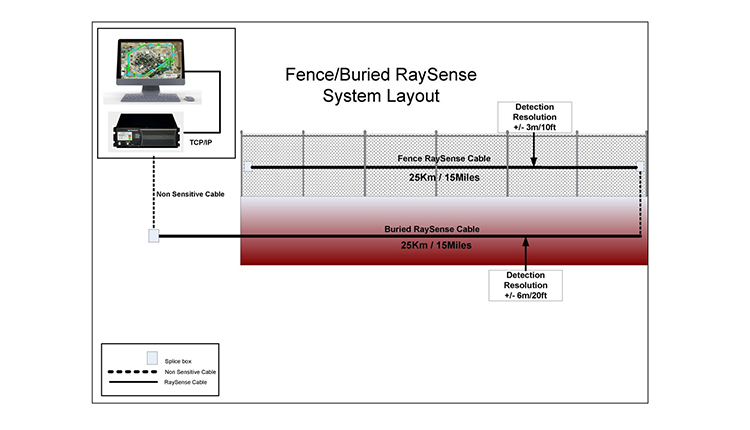How Security Fibers Are Used to Enhance the Effectiveness of Security Surveillance Systems
How Security Fibers Are Used to Enhance the Effectiveness of Security Surveillance Systems
Blog Article
Secure Your Residential Property With Trustworthy Fiber Optic Safety Solutions
In an era where safety and security risks are progressively advanced, the requirement for efficient defense remedies is paramount. Fiber optic safety and security systems stand out by providing outstanding integrity and efficiency, leveraging innovative light transmission innovation to enhance monitoring capacities. security fibers. Understanding the intricacies of fiber optic security can light up the course to protecting your property more properly.
Benefits of Fiber Optic Safety And Security
Fiber optic security options offer a variety of benefits that make them increasingly important in today's electronic landscape. Among the most substantial advantages is their superior data transfer capability, which enables the transmission of huge amounts of data over cross countries without substantial signal deterioration. This capability is specifically beneficial for security systems that count on high-definition video clip monitoring and real-time surveillance.
Furthermore, fiber optic cables are naturally more safe than conventional copper circuitry. They are immune to electro-magnetic interference, making them much less susceptible to hacking or eavesdropping. This improved security is vital for protecting delicate information and maintaining the honesty of surveillance systems.
Moreover, optical fiber are much more sturdy and resistant to environmental variables, such as moisture and temperature level variations, guaranteeing long-lasting integrity and decreased upkeep prices. The lightweight nature of fiber optic cords additionally streamlines installation processes, permitting for better flexibility in system style.
Just How Fiber Optic Systems Work
In modern-day protection applications, the procedure of fiber optic systems counts on the concepts of light transmission with versatile glass or plastic fibers. These fibers are developed to carry light signals over cross countries with marginal loss, making them suitable for sending data connected to safety and security monitoring. The core of the fiber, bordered by a cladding product, makes sure that light signals stay consisted of within the core through a sensation referred to as overall interior reflection.
When incorporated right into safety systems, fiber optic cable televisions can transmit information from different sensors, such as electronic cameras, activity detectors, and alarms, to a central surveillance station. The high data transfer capability of fiber optics allows for the transmission of huge quantities of data at the same time, enabling real-time security and timely response to possible dangers.

Types of Fiber Optic Protection Solutions
Different kinds of fiber optic protection remedies have arised to enhance security and security across various environments. One noticeable option is fiber optic perimeter breach detection systems (PIDS), made to keep an eye on and secure building boundaries via the detection of resonances and disturbances along fiber optic cords. These systems give real-time informs, making it possible for timely responses to unauthorized accessibility efforts.
One more efficient solution is fiber optic video security. This technology leverages high-definition cams attached through fiber optic cords to transmit video data over fars away without substantial loss of quality. This configuration is particularly valuable in extensive locations, such as airports and industrial sites, where standard copper cables might fail.
Additionally, fiber optic sensors are increasingly utilized for ecological tracking, spotting adjustments in temperature level, pressure, or acoustic signals that might show safety breaches or dangerous problems. These sensors supply high level of sensitivity and precision, making them excellent for vital facilities defense.

Installation and Upkeep Tips
Reliable installation and maintenance of fiber optic safety and security remedies are important for ensuring their ideal efficiency and longevity. Fiber optic cable televisions need to be directed safely, preventing sharp bends or spins that could compromise their integrity.
During setup, it is recommended to carry out comprehensive screening of the system to validate that all components are operating appropriately. Regular maintenance checks need to be scheduled to examine the fiber optic cables for any kind of indications of wear or damages, in addition to to make sure that connections remain secure. Cleaning the adapters regularly is additionally important to avoid over at this website signal loss due to dirt or debris.
In addition, keeping an updated supply of set up parts and their specifications can facilitate simpler troubleshooting and upgrades. By adhering to these installment and maintenance pointers, residential or commercial property owners can make the most of the effectiveness of their fiber optic protection solutions, ensuring a trusted defense versus prospective hazards.
Contrasting Costs and Effectiveness
When assessing fiber optic security remedies, recognizing the balance in between prices and effectiveness becomes critical (security fibers). Organizations must consider the ahead of time financial investment, continuous upkeep expenses, and the long-lasting value these systems give. While fiber optic systems may call for a higher first installment price contrasted to traditional copper circuitry, their resilience and minimized vulnerability to electro-magnetic disturbance often equate to reduced upkeep prices over time
Efficiency is one more critical factor; fiber optic safety and security systems provide improved data transmission speeds and enhanced dependability. They can cover bigger ranges without signal degradation, making them ideal for large properties or remote places. In addition, the high data transfer capacity sustains innovative security applications, such as high-def video surveillance and real-time monitoring, which are essential for extensive safety management.
Ultimately, the selection between price and performance must be directed by specific safety and security requirements and run the risk of assessments. Organizations must examine their special needs, taking into consideration aspects like home dimension, safety threats, and technical improvements. By conducting a thorough cost-benefit evaluation, stakeholders can make informed decisions that align with their safety and security goals while guaranteeing an audio investment in redirected here fiber optic innovation.
Conclusion
In verdict, fiber optic safety and security services use substantial benefits in regards to efficiency, dependability, and resistance to environmental interferences. These systems enhance security capacities and boundary security, making them an efficient selection for detailed defense. Although preliminary installment costs may be higher, the lasting benefits, including lowered upkeep and exceptional functionality, justify the financial investment. Ultimately, the fostering of fiber optic modern technology represents a forward-thinking approach to securing residential properties against advancing protection risks.
Report this page